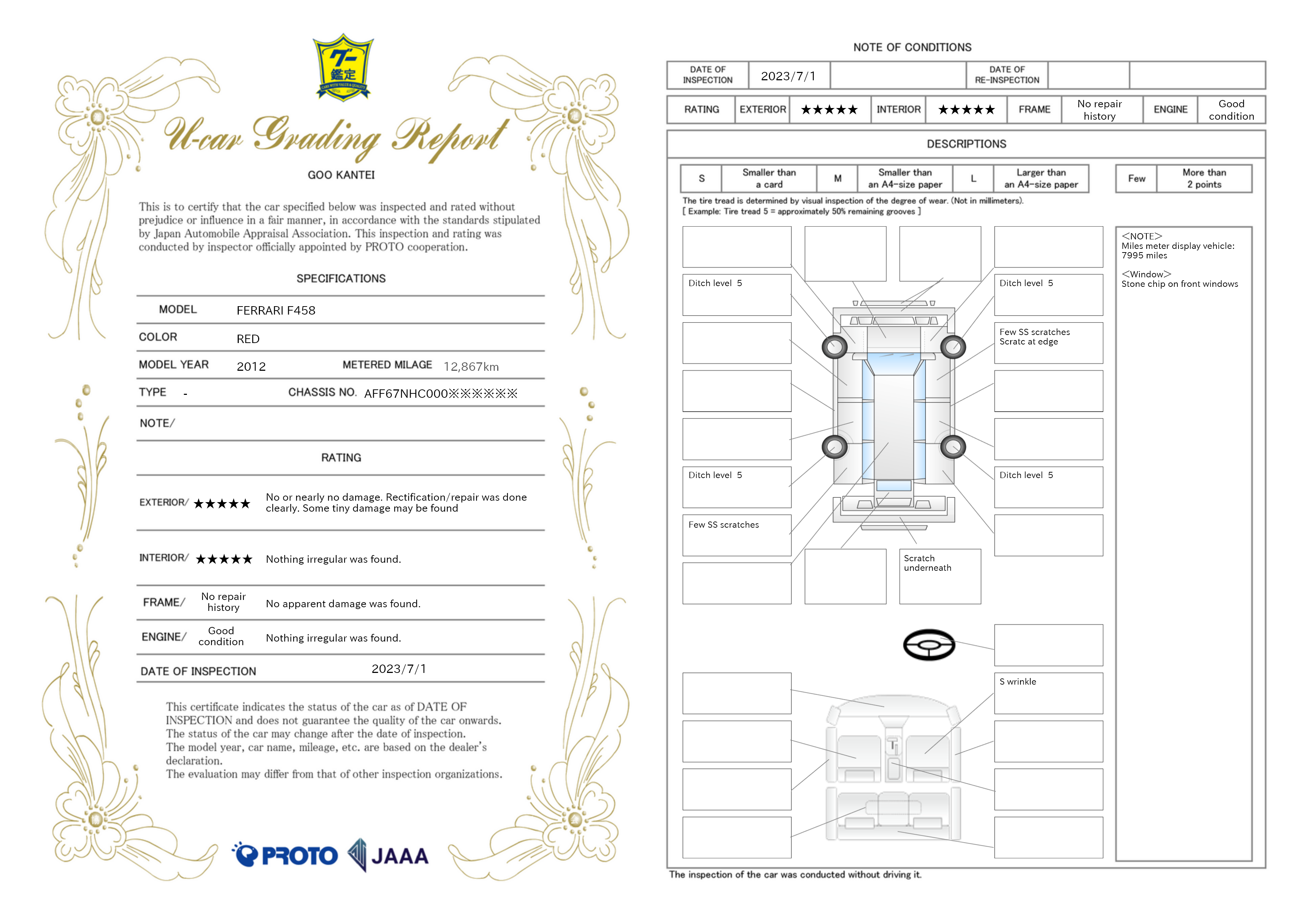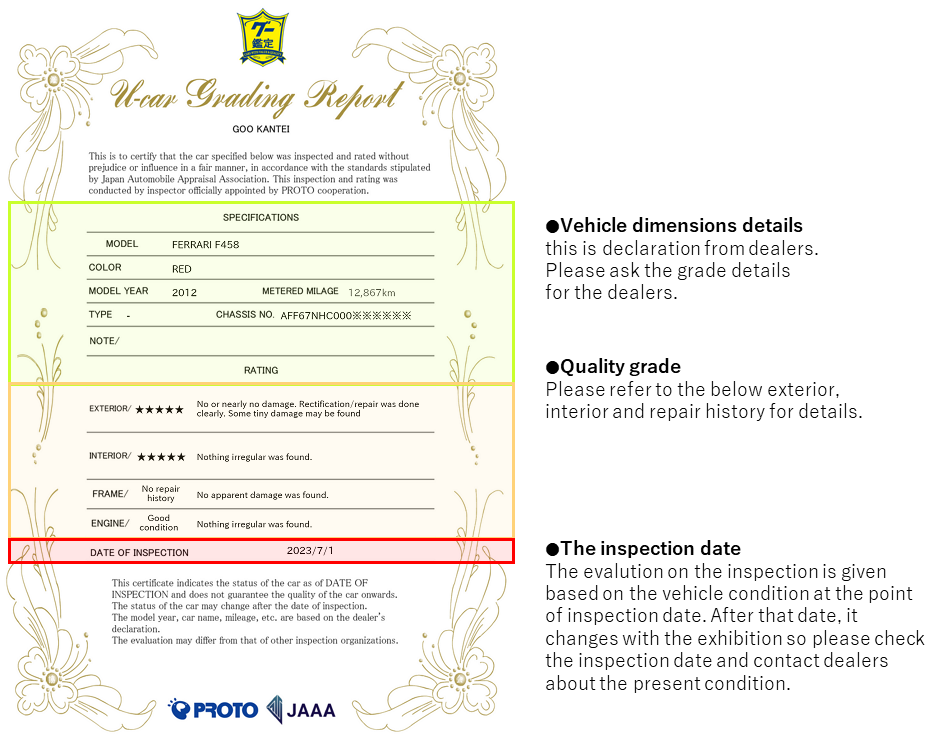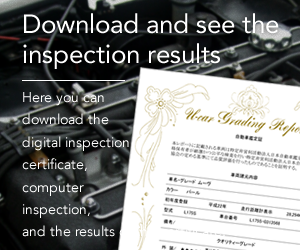
A token of the fair and open information disclosure
The inspection certificate to show the evaluation and condition check sheets that the vehicle condition is stated and is the basis for its evaluation is attached to inspected cars in car dealers.
How to use the inspection certificate and condition check sheet
For example, if ★★★★ evaluation was given to the exterior of the vehicle, the quality of parts and condition are different.
In that case, please check the quality of parts and condition using a condition check sheet.
If you selected cars at which you’d like to have a look, let’s look at the cars in a dealer.
JAAA defines the size of the exterior and interior quality but the image of the car is different from whether you think of it from textual information or you actually see it.
With your own eyes on the car, you can purchase it at ease.

How the inspection certificates and condition check sheets work
The inspection certificates and condition check sheets just show the vehicle condition at the time of diagnosis and it doesn’t guarantee the quality in the future.
The key point of inspection certificate!

Exterior
| ★★★★★ | No or nearly no damage. Repairs and refinishing have been done properly. Only some tiny damage may be found |
|---|---|
| ★★★★ | There are damages which are smaller than A4-size sheet and/or width. Defects on the bodywork due to repairs and/or damages smaller than a card in length and/or width can be seen on more than 4 areas of the bodywork. |
| ★★★ | There are damages which are larger than A4-size length and/or width. Defects on the bodywork due to repairs and/or damages larger than a card in length and/or width can be seen on more than 4 areas of the bodywork. |
| ★★ | Exterior has a poor condition. |
| ★ | Repair/refinishing work will be necessary on the exterior. |
Interior
| ★★★★★ | Well maintained and clean with no visible damage. |
|---|---|
| ★★★★ | Good condition but with some areas showing damage or are worn out excessively. |
| ★★★ | Acceptable condition but with some areas showing damage or are worn out excessively. There may also be damage such as stains, cigarette burns or tears/ cuts on the seat fabric or interior surfaces. |
| ★★ | Interior has a poor condition and/or appearance. |
| ★ | Repairs or rectification will be needed. |
Repair history
| Excellent Condition | No apparent damage was found. |
|---|---|
| Good Condition | Damage or traces of repair found in the front parts and / or rear parts of frame. |
| Acceptable Condition | Much damage or traces of repair found in the deeper front parts and / or rear parts of frame. |
| Needs Rectification | Much damage or traces of repair found in the frame surrounding the cabin. |
As a matter of principle, the vehicle except for ones with no damages fall under “Judgement standard of repair history” that Japan automobile appraisal association foundation set forth. Vehicles with little, some and heavy damages are uniquely defined by JAAA.
Flooded
| Not flooded | Nothing abnormal is found |
|---|---|
| Lv1 | Lv1 means at the state that water soaks into the seat bottom in the car |
| Lv2 | Lv2 means at the state that water soak into a seat in the car. |
| Lv3 | Lv3 means at the state that the entire car was submerged underwater. |
Condition check sheets This is the key point!

Exterior
| 1 | Front fender (right & left side) |
| 2 | Bonnet |
| 3 | Front bumper / Front spoiler / Front radiator grille |
| 4 | Front tire (right & left side) / Alloy wheel |
| 5 | Front door (right & left side) |
| 6 | Side step (right & left side) |
| 7 | Rear door (right & left side) |
| 8 | Rear tire (right & left side) / Alloy wheel |
| 9 | Rear fender (right & left side) |
| 10 | Roof / Roof rail / Roof spoiler |
| 11 | Boot lid / Trunk lid / Rear boot gate / Rear trunk gate |
| 12 | Rear end panel |
| 13 | Rear bumper / Rear (under) spoiler / Garnish |
Interior
| 1 | Steering |
| 2 | Dashboard / Glove box / Meter food |
| 3 | Right / left Front seat |
| 4 | Right / left trim |
| 5 | Rear seat |
| 6 | Console |
| 7 | Rear tray |
Damages other than development diagram
| Repaired parts history | About the vehicles that have damages in repair history evaluation, the damaged parts and condition (damages, repair and exchange) are stated. About the vehicles that don’t have a repair history, if their skeleton was damaged, their parts name and condition (little damage) is stated. |
|---|---|
| Windows | Damage to the windows |
| Lights | Damage to lights |
| Underbody parts | Damage to underbody parts facing the ground |
| Special instruction for the interior | Damage that cannot be described on a Interior development sheet |
| Special instruction | Damage and part of the engine failures that cannot be described in the above |
About the engine
JAAA has an unique checking items called engine.
The following 7 items are checked. We check whether there is obvious failure or not at the point of inspection.
Engine, transmission, drive shaft boots, exhaust (sound), air-conditioner, power steering, power window
※The checked used cars are exhibited in a dealer shop for sale so the check is limited to the one that can be performed in a way that the cars are stopped and there is no check in a way that the cars are running.



 Japan automobile appraisal association (NPO corporation JAAA) is making the system and environment to get rid of customer's anxiety and sense of distrust against used cars. We always perform actions at a neutral position and aim to create affluent automobile society by bringing apparent changes to people's life and society.
Japan automobile appraisal association (NPO corporation JAAA) is making the system and environment to get rid of customer's anxiety and sense of distrust against used cars. We always perform actions at a neutral position and aim to create affluent automobile society by bringing apparent changes to people's life and society.
